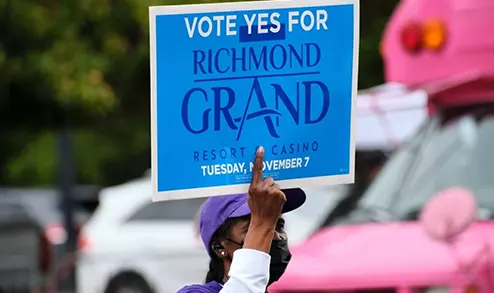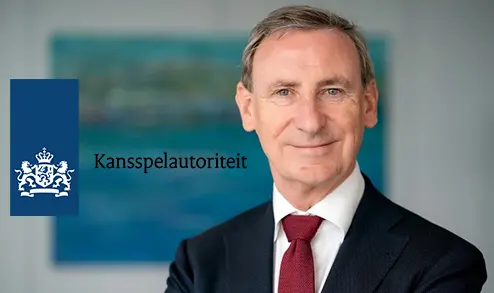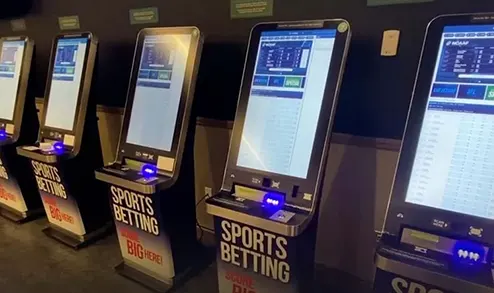 The citizens of Richmond will once again vote on whether a $562 million casino resort, originally proposed two years prior, will be approved. The previous vote resulted in the referendum’s failure to pass.
The citizens of Richmond will once again vote on whether a $562 million casino resort, originally proposed two years prior, will be approved. The previous vote resulted in the referendum’s failure to pass.
Richmond Mayor Levar Stoney’s new proposal follows a $10 million marketing campaign by media conglomerate Urban One and the operator of the Kentucky Derby race, Churchill Downs. This campaign was undertaken with the goal of convincing Richmond’s residents that the establishment will be beneficial to Virginia’s capital city.
The Richmond Grand Resort and Casino, as it is now named, will be built in District 79 if approved. Its premises will house a sportsbook and space for table games and slot machines. A hotel with a 250-room capacity will also open, and guests will be able to enjoy an outdoor park and various dining and beverage venues. Finally, the project will also include a concert hall that will be able to seat 3,000 guests. In total, all of these amenities, coupled with the casino and sportsbook, will result in 1,300 permanent job positions. The casino’s supporters have also highlighted how the project will contribute toward Richmond in terms of tax revenue. According to predictions, the tax revenue generated will amount to $30 million annually.
Preliminary Poll Suggests Voters Might Reject the Proposal
A poll centered around the matter was held in October by polling company co/efficient, and a little over 900 Richmond citizens participated, with 34% of voters residing in the casino’s district. As reported by ABC 8News, 49% of voters voiced their support for the project. In contrast, 52% voted firmly against the casino resort or stated that they were not likely to back the project.
Another aspect of the survey had to do with voters’ judgment of the project in the 2021 vote, with 45% of the participants saying they backed the project, while 46% answered that they rejected the proposal. The remaining 10% either did not participate in the 2021 poll, or were not certain of their vote. These results mirror the 2021 results, where a difference of just under 2% resulted in the project being rejected.
Apart from the substantial pro-casino campaign, the project does have significant opponents, with the organization “No Means No Casino” being at the center of the efforts to influence voters. One of the core arguments has to do with the fact that the previous attempt to gain voters’ support in favor of the casino failed, as shown in the 2021 vote. Anti-casino lobbyists have also emphasized problem gambling as another potential negative consequence of the casino resort’s opening.
This campaign’s supporters include Richmond Action LLC and attorney Paul Goldman, among other backers. Goldman was the target of antisemitic remarks from Preston Brown, ex-host of an Urban One radio show, due to Goldman’s involvement in the anti-casino efforts. CEO of Urban One, Alfred Liggins, issued an apology to Goldman following the incident, and Mayor Stoney condemned the remarks.
 Camilla Rosenberg, Director General of Spelinspektionen, the Swedish Gambling Authority, has issued a statement regarding the Ministry of Finance’s recent report on “Enhanced consumer protection against risky lending and over-indebtedness”. The government consultation, published in July 2023, offered the implementation of a credit card ban on all gambling-related transactions in the Scandinavian country. The 650-page report focused on examining the Swedish market for consumer credit and proposing measures to counteract gambling with funds that players cannot repay.
Camilla Rosenberg, Director General of Spelinspektionen, the Swedish Gambling Authority, has issued a statement regarding the Ministry of Finance’s recent report on “Enhanced consumer protection against risky lending and over-indebtedness”. The government consultation, published in July 2023, offered the implementation of a credit card ban on all gambling-related transactions in the Scandinavian country. The 650-page report focused on examining the Swedish market for consumer credit and proposing measures to counteract gambling with funds that players cannot repay.  Videoslots is facing a fine of SEK 9 million (approximately $810,700) after the Swedish Gambling Authority (Spelinspektionen) found the company to have been unsuccessful in taking adequate measures to prevent money laundering. Spelinspektionen began its investigation on November 2, 2021, and it involved Videoslots providing the regulator with a list of customers that were selected based on their deposit activity in 2020 and 2021. The watchdog then picked 10 random players from the list.
Videoslots is facing a fine of SEK 9 million (approximately $810,700) after the Swedish Gambling Authority (Spelinspektionen) found the company to have been unsuccessful in taking adequate measures to prevent money laundering. Spelinspektionen began its investigation on November 2, 2021, and it involved Videoslots providing the regulator with a list of customers that were selected based on their deposit activity in 2020 and 2021. The watchdog then picked 10 random players from the list. René Jansen, the Chair of the Netherlands Gaming Authority (KSA), has recently insisted on implementing more stringent monitoring of the Dutch online gambling market. He outlined his view on the industry’s ongoing development and challenges in a blog post, entitled “Gambling addiction: prevention is better than cure” and published on the official webpage of the Kansspelautoriteit on October 31, 2023.
René Jansen, the Chair of the Netherlands Gaming Authority (KSA), has recently insisted on implementing more stringent monitoring of the Dutch online gambling market. He outlined his view on the industry’s ongoing development and challenges in a blog post, entitled “Gambling addiction: prevention is better than cure” and published on the official webpage of the Kansspelautoriteit on October 31, 2023. According to data from the National Lottery Trust Fund (NLTF), over 65 million Nigerians spend an average of $15 on sports betting on a daily basis. The data also revealed that 14 million online bets are placed every day. This information was disclosed on Tuesday by Executive Secretary of the NLTF Bello Maigari during the second edition of Nigeria’s national gaming conference.
According to data from the National Lottery Trust Fund (NLTF), over 65 million Nigerians spend an average of $15 on sports betting on a daily basis. The data also revealed that 14 million online bets are placed every day. This information was disclosed on Tuesday by Executive Secretary of the NLTF Bello Maigari during the second edition of Nigeria’s national gaming conference. The European Gaming and Betting Association (EGBA) has met with enthusiasm Finland’s intentions to abandon the state-run gambling monopoly model and launch a multi-licensing system. The shift towards multi-licensing gambling models across EU states is generally seen as a positive trend, as it is a fundamental element of any properly functioning and competitive market.
The European Gaming and Betting Association (EGBA) has met with enthusiasm Finland’s intentions to abandon the state-run gambling monopoly model and launch a multi-licensing system. The shift towards multi-licensing gambling models across EU states is generally seen as a positive trend, as it is a fundamental element of any properly functioning and competitive market.  Nevada’s gambling authority is examining potential changes to a policy that has, thus far, demanded any licensed casino to pay jackpots to trespassers. As reported by the Las Vegas Review-Journal, the issue is being addressed in light of a recent ruling by the Nevada Gaming Control Board (NGCB) that required the Casablanca hotel-casino in Mesquite to honor a jackpot won by Rhon Wilson. The individual in question is a repeat offender who has trespassed on the casino’s premises multiple times since 2011. Wilson was not allowed to enter the casino and place wagers at the time he placed the winning wager, yet he was paid $2,045 after the NGCB ruled in his favor in early October.
Nevada’s gambling authority is examining potential changes to a policy that has, thus far, demanded any licensed casino to pay jackpots to trespassers. As reported by the Las Vegas Review-Journal, the issue is being addressed in light of a recent ruling by the Nevada Gaming Control Board (NGCB) that required the Casablanca hotel-casino in Mesquite to honor a jackpot won by Rhon Wilson. The individual in question is a repeat offender who has trespassed on the casino’s premises multiple times since 2011. Wilson was not allowed to enter the casino and place wagers at the time he placed the winning wager, yet he was paid $2,045 after the NGCB ruled in his favor in early October. This Thursday, the Illinois Gaming Board unanimously authorized Bally’s Casino to operate at its temporary site at Medinah Temple until September 2026 and gave the business an operating license for its permanent facility which is to be constructed at the former Chicago Tribune Publishing Center.
This Thursday, the Illinois Gaming Board unanimously authorized Bally’s Casino to operate at its temporary site at Medinah Temple until September 2026 and gave the business an operating license for its permanent facility which is to be constructed at the former Chicago Tribune Publishing Center. In a statement to the Legal Sports Report (LSR), Milton Champion, Executive Director of the Maine Gambling Control Unit, announced that Underdog Fantasy has been fined with $391,850 for giving its Maine-based users the opportunity to partake in pick ‘em-style Daily Fantasy Sports (DFS) events. The company was ordered to stop offering such contests until further notice.
In a statement to the Legal Sports Report (LSR), Milton Champion, Executive Director of the Maine Gambling Control Unit, announced that Underdog Fantasy has been fined with $391,850 for giving its Maine-based users the opportunity to partake in pick ‘em-style Daily Fantasy Sports (DFS) events. The company was ordered to stop offering such contests until further notice. Coljuegos, Colombia’s regulator of land-based and online gambling, has released the most recent resolution depicting its approach to newly proposed gambling advertising regulations. If approved by Congress, they would enter into force as of January 1, next year, establishing Coljuegos as the country’s central gambling advertising authority.
Coljuegos, Colombia’s regulator of land-based and online gambling, has released the most recent resolution depicting its approach to newly proposed gambling advertising regulations. If approved by Congress, they would enter into force as of January 1, next year, establishing Coljuegos as the country’s central gambling advertising authority.